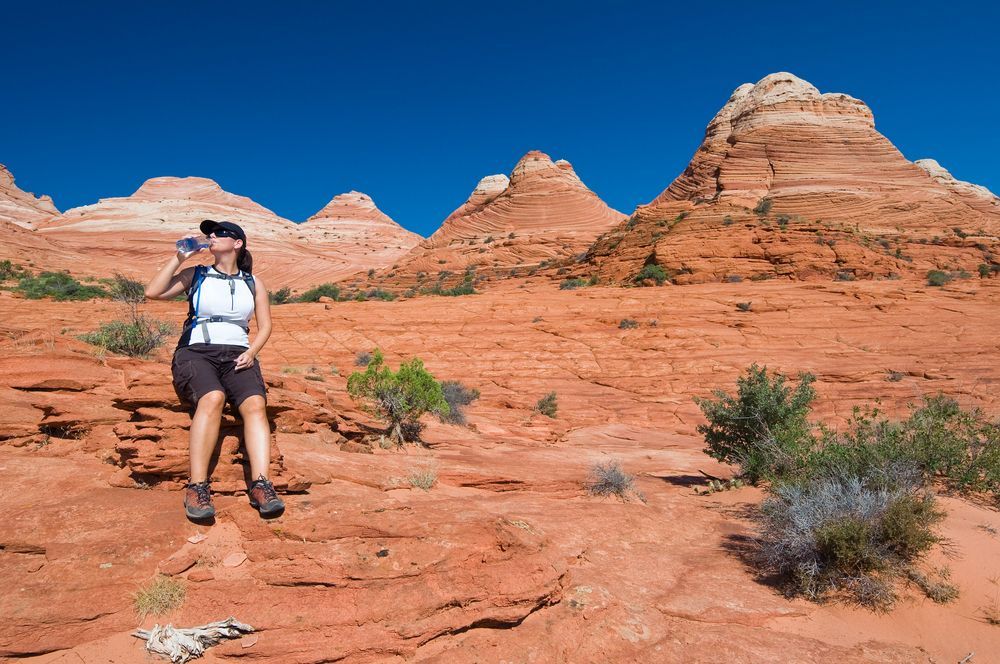The Importance of Hydration in Arizona’s Climate

Arizona is known for its stunning deserts and breathtaking landscapes, but its extreme climate can pose serious challenges to health and well-being, particularly concerning hydration. Understanding how to maintain proper hydration is essential for anyone living in or visiting this region.
Understanding Arizona's Unique Climate
Arizona features a diverse climate influenced by its geography, but it is predominantly characterized by high temperatures and low humidity levels, especially during the summer months. This unique combination makes it essential for residents and visitors to be mindful of their hydration needs.
The Role of Temperature and Humidity
In Arizona, temperatures can soar above 100°F in the summer, leading to increased perspiration and fluid loss. The dry air means that moisture evaporates quickly from the skin, further increasing the risk of dehydration.
Conversely, during the winter months, temperatures can drop significantly, yet the low humidity persists. Even in cooler temperatures, it is crucial to maintain water intake as the body still loses fluids through breathing and other daily activities.
Seasonal Variations and Their Impact
Arizona's seasons also affect hydration needs. The monsoon season, for example, brings increased humidity but can still result in dehydration due to extended outdoor activities. It's essential to adjust hydration practices according to the season.
During the winter, while people may feel less thirsty, they might still neglect fluid intake, which can lead to chronic dehydration issues. Understanding these seasonal changes helps individuals manage their hydration effectively throughout the year.
Moreover, the unique geography of Arizona, with its deserts, mountains, and plateaus, contributes to microclimates that can vary dramatically even within short distances. For instance, the high elevations of the San Francisco Peaks can experience snowfall while the desert floor remains arid and hot. This variation means that outdoor enthusiasts must be particularly vigilant about hydration, as conditions can change rapidly. Engaging in activities such as hiking or biking in these diverse environments requires not only awareness of the temperature but also a proactive approach to fluid intake.
Additionally, the cultural aspects of Arizona's climate cannot be overlooked. Many local traditions and events, such as the vibrant festivals celebrating the monsoon rains, highlight the community's relationship with the weather. These gatherings often emphasize the importance of staying hydrated while enjoying outdoor festivities, showcasing how the climate shapes not just the environment but also the lifestyle and social practices of Arizonans. Understanding these connections can enhance one’s appreciation of the state’s rich cultural tapestry while navigating its challenging climate.
The Science of Hydration
Hydration goes beyond merely drinking water; it involves a complex relationship between liquid intake and bodily functions. Understanding this can empower individuals to prioritize their hydration needs more effectively.
How the Body Uses Water
Water is vital for numerous bodily functions, including digestion, circulation, temperature regulation, and waste elimination. Every cell in the body needs water to function optimally.
When you are well-hydrated, nutrients can be transported more efficiently, organs can perform their functions seamlessly, and energy levels remain steady. Thus, maintaining hydration is crucial for physical and cognitive performance.
Dehydration: Causes and Symptoms
Dehydration occurs when the body loses more fluids than it takes in. In Arizona, heat, exercise, and insufficient fluid intake are common causes of dehydration. Symptoms can range from mild to severe and include headaches, dizziness, fatigue, and confusion.
Recognizing the signs of dehydration is vital, especially in a climate where fluid loss can occur rapidly. This awareness enables individuals to take proactive steps in their hydration practices.
Hydration and Health in Arizona
Hydration is not merely about quenching thirst; it plays a crucial role in overall health, particularly in challenging climates like Arizona's. The potential health risks associated with dehydration can significantly impact quality of life.
The Effects of Dehydration on Physical Health
Chronic dehydration can lead to serious health issues, including kidney stones, urinary tract infections, and even heat-related illnesses. Athletes and those engaging in physical work must be especially vigilant in maintaining proper hydration.
Moreover, dehydration can exacerbate existing health conditions, making it essential for all Arizonans to incorporate consistent hydration strategies into their daily routines.
Mental Health and Hydration
Research suggests a direct link between hydration and mental health. Dehydration can lead to increased feelings of anxiety and mood swings. Staying properly hydrated can contribute to a more balanced emotional state and improved cognitive function.
In the vibrant communities of Arizona, collective mindfulness about drinking enough water can positively impact overall mental well-being and community health.
Practical Hydration Strategies for Arizona Residents
To thrive in Arizona's climate, effective hydration strategies must be incorporated into daily life. This understanding helps prevent dehydration and enhances overall health and performance.
Hydration Tips for Outdoor Activities
- Carry a water bottle at all times to ensure easy access to hydration.
- Drink water before, during, and after outdoor activities, especially if exercising in the heat.
- Consider electrolyte-rich drinks during prolonged activities to replace lost minerals.
- Avoid highly caffeinated or alcoholic beverages before or during outdoor excursions.
Everyday Hydration Habits
Creating daily routines around hydration can make a significant difference. Here are some tips to integrate hydration into your day:
- Set reminders on your phone to drink water at regular intervals.
- Incorporate water-rich foods into your diet, such as fruits and vegetables.
- Establish a morning and evening routine that includes drinking a glass of water.
- Keep a journal to track fluid intake and hydration levels.
Hydration and Arizona's Vulnerable Populations
Certain populations, such as children and the elderly, require special attention when it comes to hydration. Their needs and vulnerabilities differ, necessitating tailored strategies.
Special Considerations for Children and the Elderly
Children are often engaged in physical activities but may not recognize their hydration needs until they are dehydrated. Educating parents and caregivers about the importance of regular water intake for young ones is essential.
Likewise, the elderly may not experience thirst cues as vividly and can be at higher risk for dehydration. Encouraging regular drinking habits and being attentive to signs of dehydration can significantly enhance their well-being.
Hydration Advice for Athletes and Outdoor Workers
Athletes and outdoor workers face unique challenges in maintaining hydration. Understanding fluid needs based on the intensity of activity, weather conditions, and personal body composition is crucial.
Strategizing hydration around work and training schedules can lead to improved performance and reduced health risks. Applying these tailored hydration practices can help ensure that individuals remain safe and hydrated.
Conclusion
In Arizona's climate, prioritizing hydration is more than just a suggestion; it is a necessity. By understanding the climate's nuances, recognizing the science behind hydration, and adopting practical strategies, individuals and communities can thrive, regardless of the heat. The key to health in this desert landscape lies in maintaining a consistent focus on hydration.










